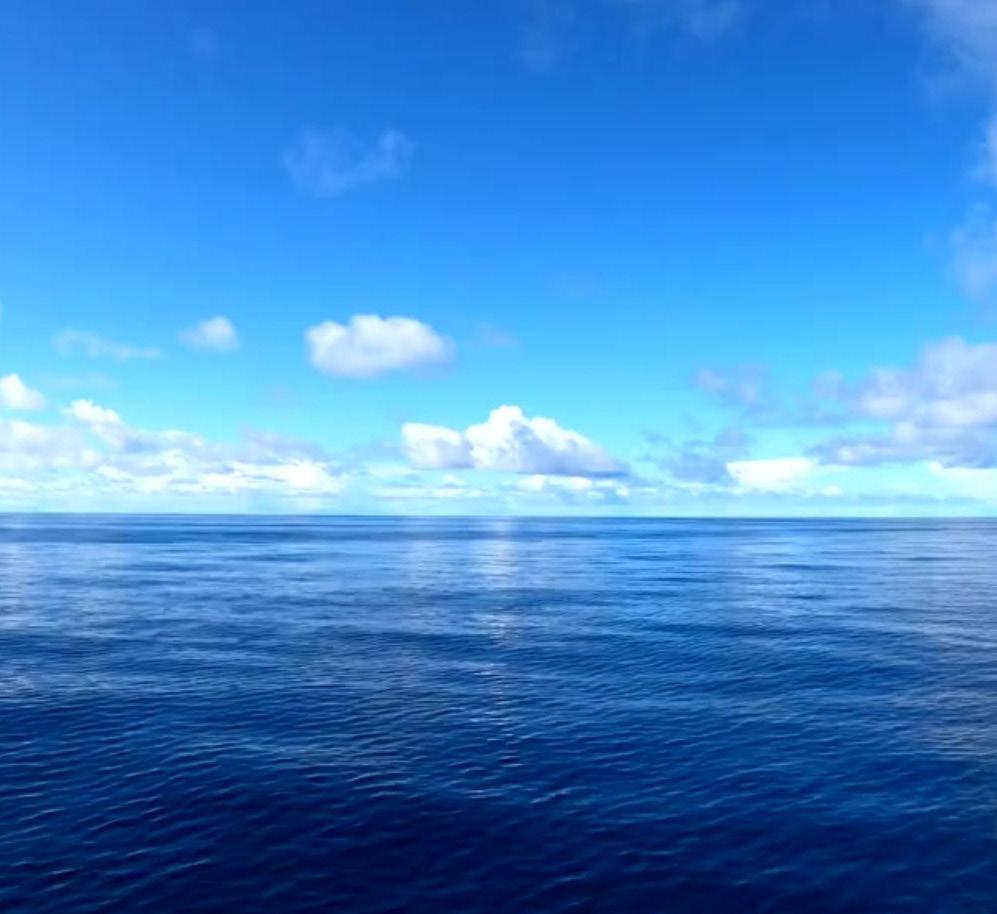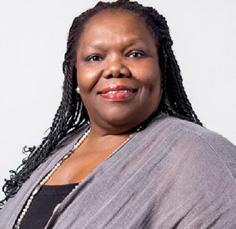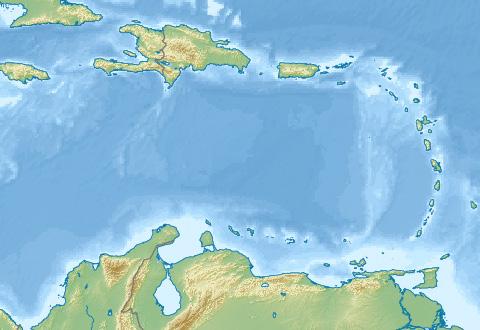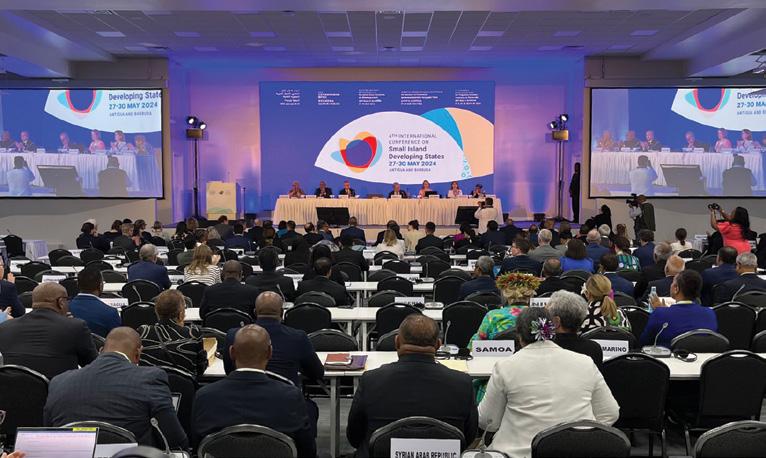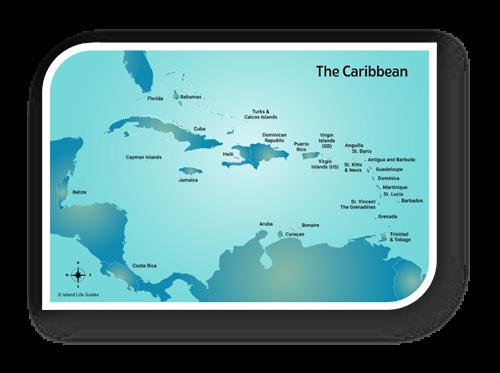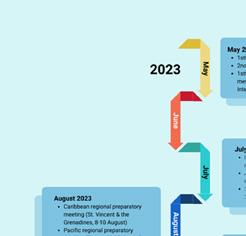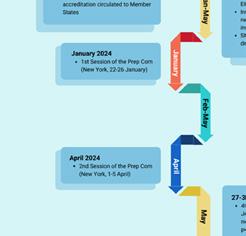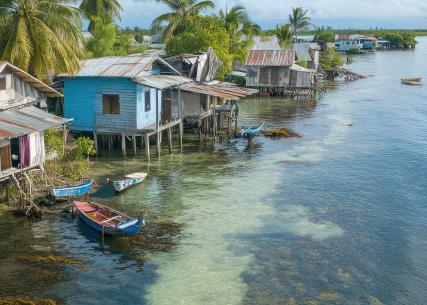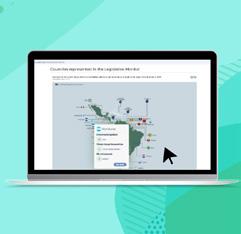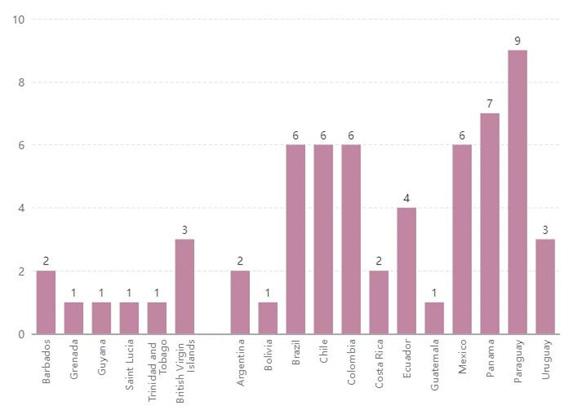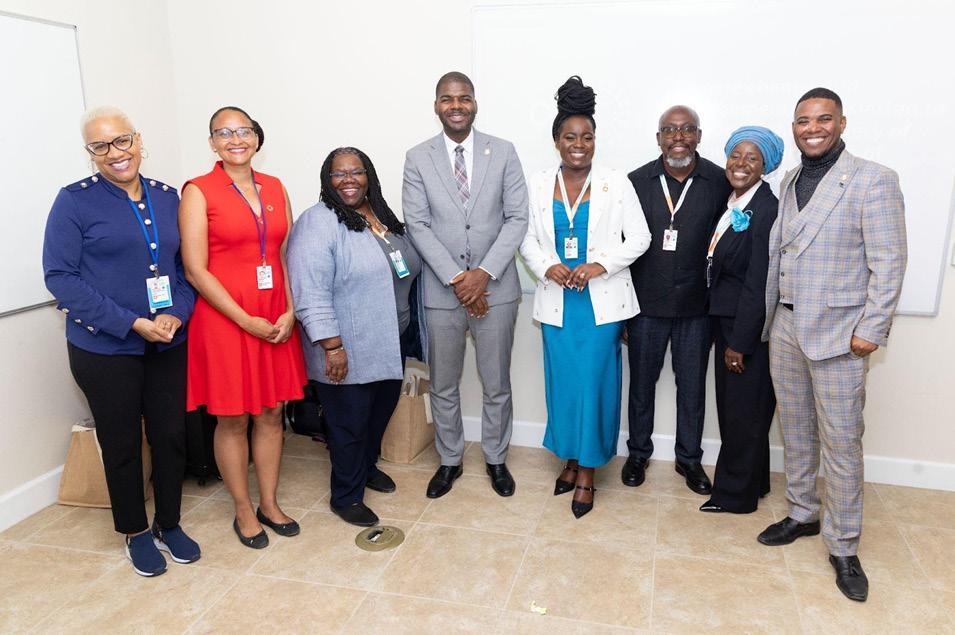SIDS 4: NOW OR NEVER FOR SMALL ISLAND SURVIVAL
"SIDS are a test case for climate justice and financial justice," declared United Nations Secretary-General Antonio Guterres at the Opening Ceremony of the Fourth International Conference on SIDS (SIDS4) on Monday, May 27, in Antigua and Barbuda.
Sustainable Development (C-SIDS Mechanism for Sustainable Development). It supports the implementation, integration, coordination, monitoring, and reporting of Caribbean SIDS sustainable development agendas, including the ABAS. The C-SIDS Mechanism for Sustainable Development aligns with the need to accelerate the implementation of the SIDS POW and other key international agreements. These include the 2030 Agenda for Sustainable Development, the Addis Ababa Agenda, the Paris Agreement on climate change, the Sendai Framework for Disaster Risk Reduction, the New Urban Agenda, and the Kunming-Montreal Global Biodiversity Framework.
The article that follows showcases a regional project, the Parliamentary Observatory for Climate Change and Just Transition (OPCC), as an example of ECLAC supporting Caribbean SIDS in climate change management. This project aims to assist decision-makers, legal officers and other stakeholders in developing and enhancing the region's environmental and climate change legislation. The article details the project's objectives, purpose, and significant achievements, including establishing an open-access Latin America and the Caribbean Environmental and Climate Change Legislative Database. The data and other information in this database are valuable for policymakers and researchers working on climate change and environmental law in the region.
The final article in this issue discusses the urgency for effective communications strategies for SIDS, their plight and to
ensure that they are not ignored in global sustainable development. It argues that SIDS have the potential to communicate and influence globally, but any successful communication strategy will need to incorporate a collaborative approach among all SIDS, with consistent and clear messaging and detailed planning, while forging strategic alliances.
Implementing the ABAS requires SIDS-led approaches that build on the foundation of individual SIDS sovereignty. SIDS governments are encouraged to demonstrate ownership, even as they work to assure adequate human and institutional resources for bold investment in ABAS ambitions, fostering sustained engagement across sustainable development sectors. Undoubtedly, SIDS cannot achieve these goals alone; robust international support, including that of the private sector, will be crucial to advancing this SIDS development platform in the coming decade. Such support will be essential for navigating ever-increasing economic, social, environmental, and geopolitical challenges and, for pursuing a road map that charts the priorities and aspirations of the subregion, in order to achieve resilient prosperity for all.
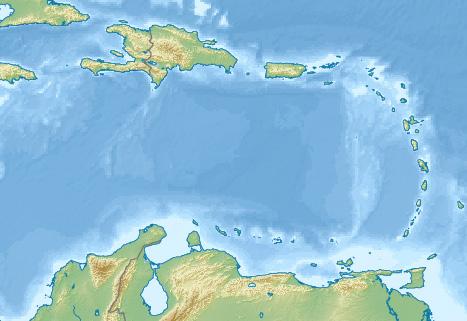


The leadership of the United Nations and the wider international community, including over fifty Heads of Government and Heads of State, are focusing on the smallest and most vulnerable member countries this week with the Fourth International Conference on Small Island Developing States (SIDS4) in Antigua and Barbuda. This meeting reviews the sustainable development progress of SIDS over the past decade and adopts a new action platform for the next ten years.
Of the 57 countries identified as SIDS by the UN, 29 are in the Caribbean, comprising 16 member States and 13 territories. The Economic Commission for Latin America and the Caribbean (ECLAC) is committed to providing essential, targeted support to this subregion in its pursuit of sustainable development. The 2024 Atlantic hurricane season, beginning on June 1st, just two days after the conference ends, is predicted to be the hottest and most active season on record, underscoring the extreme vulnerability of these countries to climate-related impacts.
Beyond their vulnerability to climate change, the subregion faces high levels of debt, a consequence of low growth and high financing costs in capital markets, compounded by the increasing frequency and severity of hurricanes and tropical storms. In 2017, category 5 hurricanes Irma and Maria caused extensive damage in the Caribbean
SECURING GREATER AND SUSTAINED ACCESS TO LONG-TERM, LOW-COST FINANCE FOR SMALL ISLAND DEVELOPING STATES (SIDS)
Opinion from the desk of the Executive Secretary of UN ECLAC José Manuel Salazar-Xirinachs*
Going into the Fourth International Conference on Small Island Developing States (SIDS4), Caribbean SIDS, as they have traditionally done, approached with high ambitions and hopes for the international community to “turn up” for small islands. This is a reflection of the anticipated outcomes, some of the major decisions of SIDS4 and a juxtaposition of major decisions from previous SIDS Conferences.
amounting to approximately US$97 billion, and Hurricane Dorian in 2019 resulted in US$3.4 billion in losses and damage in The Bahamas alone.
The subregion also faces fiscal stress due to other external shocks. The COVID-19 pandemic crippled the tourism-dependent economies of the Caribbean, pushing many governments to the brink of insolvency. Amid high debt and servicing costs, public investment in social infrastructure and services has stagnated or even declined in some cases.
The Caribbean's debt constraint and its impact on growth are well recognized. ECLAC’s econometric analysis reveals a negative relationship between debt and growth in the Caribbean. Since the global crisis of 2008-2009, the Caribbean has not experienced robust growth, and its trade and foreign direct investment (FDI) performance have also declined. Six SIDS have debt-toGDP ratios exceeding 100%. Genuine development and planned resilience are unattainable when scarce resources are diverted to debt repayment.
High indebtedness negatively impacts sovereign credit ratings, subjecting the Caribbean to higher borrowing costs. However, the subregion has limited access to concessional finance for investment in resilience and growth due to their upper-middle and high-income status, a metric that ignores their high vulnerability and capacity constraints. The principal message of the SIDS4
Conference is the urgency of securing greater and more sustained access to long-term, low-cost finance for these small countries. This is reinforced by their call for “a seat at the table” where decisions regarding the reform of the global financial architecture will be made.
ECLAC has been integrally involved in supporting this effort. During the preparatory stage, ECLAC assessed development progress in Caribbean SIDS over the past decade. The Commission also led the preparation for a key interactive dialogue at SIDS4 on “Enhancing critical forms of financing and aid effectiveness through collaborative partnerships: A conversation.” Along with the dialogue on climate finance, this is a crucial discussion, as the most formidable obstacle that SIDS face is how to secure access to finance for investment in their sustainable development.
ECLAC is also launching the OPCC Parliamentary Observatory on Climate Change and Just Transition, providing parliamentarians in the Caribbean and Latin America with a common data platform to support their leadership and legal precedent in environmental legislation. Recognizing the importance of data for informed decision-making, ECLAC will co-lead five side events, including three addressing geospatial information management.
The government and the people of Antigua and Barbuda deserve
* Originally published in the Hummingbird Volume 11- Issue 4 https://issuu.com/eclaccaribbean/docs/hummingbird_-_sids_issue_apr-may_2024001?fr=sMjk1MTg0MDQyMDA
Their tireless efforts have ensured its success. The conference’s outcome document, The Antigua and Barbuda Agenda for SIDS (ABAS), focuses on partnerships, more effective support from the United Nations, and the basic development rights of island people, all framed around the Sustainable Development Goals. It also calls for more robust international support to accelerate implementation of the Paris Agreement on climate change and for the early capitalization and operationalization of the proposed Loss and Damage Fund.
The SIDS4 Conference anticipates tangible outcomes, including the launch of a SIDS Centre of Excellence, which will encompass a SIDS Data Hub, a
initiative aims to provide the necessary social and economic support that SIDS need to plan their strategy for survival and resilient prosperity.
Attention is also being given to the development of a Multidimensional Vulnerability Index, acknowledging the impact of a country’s vulnerabilities on its development trajectory. Additionally, a Debt Sustainability Support Initiative is set to launch promising multifaceted and innovative support for debtstrapped SIDS. ECLAC and the wider UN Development Group look forward to the operationalization of these initiatives with a view to offering more meaningful support to the world's islands.
To promote public awareness of this significant meeting for the Caribbean, the commission has created an impactful campaign, encouraging the world to "Imagine a World without islands." This thought-provoking campaign highlights the cultural, environmental, and economic contributions of islands, emphasizing the necessity of their preservation and support.
High-level political commitments have been made, but they come with compromises from all sides. This time, they come with the duty for all involved, especially the donor community and the UN system, to do more to support development in SIDS. ECLAC is firmly committed to this effort.
The ABAS agrees that SIDS need assistance to build resilient economies through improved connectivity and better ecosystems. It notes that SIDS need to foster safe, healthy and prosperous societies through promoting safe communities, inclusive institutions and healthier societies. ABAS recognizes that small islands need urgent support to enhance sustainable energy transition and access to affordable and reliable energy; to develop integrated water resources management; enhanced food security; and improved resilient infrastructure.
CARIBBEAN SIDS MECHANISM FOR SUSTAINABLE DEVELOPMENT
Elizabeth Thorne
As we bid adieu to the buzz that surrounded the convening of the Fourth International Conference on Small Island Developing States (SIDS), The Antigua and Barbuda Agenda for SIDS (ABAS) which was hosted by the Antigua and Barbuda government from May 27 – 30 May 2024, the future of SIDS was positioned within the context of resilient prosperity.
resource and export base, which makes them vulnerable to shocks and crises” (ABAS, 2024), SIDS have been in the forefront making contributions in finance, climate change and the management of plastic waste while continuing to uphold the mantle as the stewards of the ocean (ABAS, 2024).
SIDS are actively contributing to the global community utilizing their human capital to analyze their unique context to define the most appropriate solutions for their circumstances. SIDS across the three regions – Caribbean, Pacific and Africa Indian Ocean Mediterranean South China Sea (AIMS) are identifying solutions engaging in sharing experiences, success stories and revelations, with the
1 https://sids4.gov.ag/about.php
2 Source Caribbean Map. Island Life Caribbean. Cited July 2024 https://www.islandlifecaribbean.com/caribbean-map/
ultimate goal of improving the life and conditions of their citizens while securing the vitality of the environment which sustains all life.
VULNERABILITIES OF SIDS
The fact remains, these nations often face the full brunt of multiple shocks which include global financial crises, frequent occurrence of natural hazards – floods, hurricanes, recurring sargassum influxes, earthquakes and other destabilizing events for example, the COVID-19 pandemic, geopolitical shifts and the upsurge of unrest and wars.
The domino effect of these complex
Figure 1: The Caribbean Region2
interactions with socio and economic factors has left several SIDS grappling with unsustainable levels of debt and facing the dilemma of redirecting resources from other priorities to address the fall out of these disruptions. When these facts are juxtaposed against the reality that these nations contribute relatively minimally to global carbon dioxide emissions, nonetheless, experience the full impact of climatic events leaving their nations in shambles which sets back their sustainable development milestones, justifying the strong case for the continued advocacy for a special case for sustainable development for these countries.
Due to the Caribbean’s unique circumstances a regional response to sustainable development will assist their national response. This article will seek to examine ECLAC’s proposal of the Caribbean SIDS Mechanism for Sustainable Development’s (C-SIDS Mechanism) proposed objectives, functions and structure and its potential as a coordinating tool which could provide support in realizing measurable sustainable development milestones for Caribbean SIDS including implementation of the ABAS.
LESSONS OF THE PAST
It is critical to mention that the concept of a regional coordinating mechanism to assist in monitoring and evaluating the progress of sustainable development in SIDS is not a novel initiative. In fact, it was first conceptualized by Caribbean SIDS the year after the BPoA was adopted and formalised in 2006 at the 21st Session of the Caribbean Development Cooperation Committee (CDCC) as a mechanism tailored towards enhancing the implementation of the MSI.
Then known as the Regional Coordinating Mechanism (RCM), however, there were barriers that prevented the full operationalization of this iteration of the mechanism. Recognizing the constraints of the RCM in 2018 the Member States called for the restructuring of the mechanism during the 27th Session of the CDCC to serve the implementation of the SIDS Agenda and the Sustainable Development Goals (SDGs). Even then, there was little traction in successfully mobilizing full buy-in the region to set the mechanism into full operation. Some of the issues faced were limited resources needed to institutionalize the mechanism, a lack of ownership by the member countries, non-identification of national focal points, the latter being a critical pivot in the mechanism.
However, Member States recognized the significance of the RCM and in 2020, during the 28th Session of the CDCC reiterated the need for restructuring and refocusing the RCM (CDCC Resolution 104 (XXVIII). ECLAC responded renaming the mechanism, the “Caribbean SIDS Mechanism for Sustainable Development” (C-SIDS) extending its mandate to function as the subregional mechanism to monitor and support the implementation of sustainable development in Caribbean SIDS.
The following box captures this Caribbean Development and Cooperation Committee resolution3:
RECOGNIZING THAT THE CDCC-RCM PROPOSED REPOSITIONING AS THE CARIBBEAN SIDS MECHANISM FOR SUSTAINABLE DEVELOPMENT IS A RELEVANT SUBREGIONAL RESOURCE PROVIDING A PLATFORM TO PRIORITIZE AND ACCELERATE THE IMPLEMENTATION OF CARIBBEAN SIDS SUSTAINABLE DEVELOPMENT AGENDAS,
1. Approves the renaming of the CDCC-RCM to the Caribbean SIDS Mechanism for Sustainable Development;
2. Also approves that the Caribbean SIDS Mechanism for Sustainable Development be given an expanded mandate, scope and function to serve as a principal subregional mechanism for monitoring and supporting sustainable development implementation in the Caribbean SIDS;
3. Agrees that the Caribbean SIDS Mechanism for Sustainable Development will serve in supporting the Caribbean’s participation in, and reporting to, the annual Forum of Countries of Latin America and the Caribbean on Sustainable Development;
4. Also agrees that the functions of the Caribbean SIDS Mechanism for Sustainable Development will include fostering linkages with intergovernmental bodies, UN agencies, and other developmental partners; and facilitating the sharing of lessons learned and best practice through SIDS-SIDS, south/south and triangular cooperation and other means;
5. Calls upon the Secretariat to make every effort to ensure that the Caribbean SIDS Mechanism for Sustainable Development is positioned as an integral part of the work programme of the ECLAC subregional headquarters for the Caribbean;
6. Requests the ECLAC Subregional Headquarters for the Caribbean to submit for the consideration of the CDCC Monitoring Committee recommendations for the effective operation of the Caribbean SIDS Mechanism for Sustainable Development.
THE REGIONAL MECHANISM REFORMULATED
Charged with this responsibility of restructuring the mechanism ECLAC subregional headquarters for the Caribbean determined a new visioning of the operationalization of mechanism and proposed two possibilities “form follows function” and the “modular approach”. The latter approach was highlighted and elaborated for the proposal resulting in the formulation of a clear definition for the C-SIDS Mechanism for sustainable development:
“A mechanism owned by the States and territories of the Caribbean subregion, tasked with monitoring the progress of implementation of the sustainable development agendas of Caribbean SIDS, provides capacity support to countries in implementing their sustainable development priorities through multistakeholder engagement and facilitates SIDS-SIDS cooperation.”
Caribbean SIDS were fully engaged throughout the preparatory meetings leading up to the 4th International SIDS Conference, Figure 2 tracks this pathway. Both the Praia Declaration4 and Kingstown Outcome Document5 emphasized the importance of regional mechanisms for SIDS. They highlighted the commitment of SIDS to collaboratively secure a resilient future and shape their agenda, while stressing the necessity of effective regional coordination to implement this agenda and previous agreements.
4 Outcome Document for the Interregional Preparatory Meeting of the 4th International Conference on SIDS Praia (Cabo Verde) Declaration https://www.un.org/ohrlls/ sites/www.un.org.ohrlls/files/files/sids_interregional_outcome_document.pdf
5 Preparatory Meeting of the Fourth International Conference on SIDS for the Caribbean Kingstown, Saint Vincent and the Grenadines, 8-10 August 2023 Kingstown (SVG) Outcome Document https://sdgs.un.org/sites/default/files/2023-10/Outcome%20document%20of%20the%20Caribbean.pdf
6 Source: https://sdgs.un.org/conferences/sids2024, citied July 2024
Figure 2: Pathway to 4th International Conference on Small Island Developing6
One of the key factors that is required for the successful functioning of the C-SIDS mechanism is the political buy-in. For this to happen, countries and territories must be convinced of the potential advantages of the mechanism, which will, once effectively functioning, would advance the region significantly. But the devil is in the details, how do we bring these stakeholders to the table and fully immerse them in visualizing the benefits of such a mechanism? Perhaps alerting them to the proposed objectives may peak their interest? The proposal puts forward five main objectives for this mechanism (ECLAC, 2024)7:
1. To assist the Caribbean region in achieving its sustainable development priorities via capacity assistance and supporting the implementation process
2. To monitor the implementation status of the SIDS Agenda
3. To expand the political advocacy for SIDS regionally and internationally
4. To facilitate SIDS-SIDS cooperation and collaboration
5. To serve as a forum for multistakeholder interactions that advance sustainable development in the region
But the successful functioning of the C-SIDS mechanism lies in the development of a robust governance structure aligned to the CDCC machinery. In doing so, the work pursued by the mechanism would be guided by the decisions taken and resolutions passed by this body. Therefore, it would be fully accountable to the CDCC, reporting on its progress on the implementation of SIDS agenda and the Caribbean’s development priorities (ECLAC, 2024).
The following diagram (Figure 4) outlines the proposed structure for the Caribbean SIDS Mechanism for Sustainable Development. Learning from the experience with the RCM, Caribbean SIDS have articulated that a regional mechanism that supports the SIDS Agenda and other sustainable development agendas must be owned by them.
7 Report of the meeting to discuss modalities for operationalizing the Caribbean Small Island Developing States Mechanism for Sustainable Development (LC/CAR/2024/5/ Rev.1)https://repositorio.cepal.org/entities/publication/b1b31e6d-e295-45c7-b031-f9f120bf4970
8 Source: https://www.google.com/imgres?q=interconnectiveness&imgurl=https%3A%2F%2Fjfsdigital.org%2Fwp-content%2Fuploads%2F2021%2F03%2F04_people. jpg&imgrefurl=https%3A%2F%2Fjfsdigital.org%2Farticles-and-essays%2Fvol-25-no-3-march-2021%2Fbeing-interconnected-at-the-time-of-covid-19-pandemic-a-callto-regain-the-sense-of-community%2F&docid=26ugQ1eQV5l64M&tbnid=R67PNECHiflA5M&vet=12ahUKEwiW8PaG4f2HAxWKmIQIHSmzEMwQM3oECBYQAA..i&w=1920&h=768&hcb=2&ved=2ahUKEwiW8PaG4f2HAxWKmIQIHSmzEMwQM3oECBYQAA
Figure 3: The C-SIDS Mechanism will promote interconnectedness8
THE PROPOSED GOVERNANCE STRUCTURE OF C-SIDS MECHANISM
Guided by the structure C-SIDS Mechanism as outlined in Figure 4 the governance architecture could be examined.
The Caribbean SIDS Mechanism for Sustainable Development Technical Group: this is the “engine room” of the C-SIDS mechanism and should include representatives from the Member States and Territories of the CDCC, Intergovernmental organizations (IGOs) and civil society with a rotating chair which should coincide with the CDCC’s chair. This group will define the work of the mechanism and have oversight of the Mechanism’s outputs.
Caribbean SIDS Mechanism Focal Points: a focal point and an alternate should be appointed by their governments to represent each State and Territory. Their role and responsibilities should be clearly defined by a Terms of Reference (TORs) to guide them accordingly.
Next is the Secretariat: the administrative arm which will bear the responsibility of organizing and convening meetings. In this iteration, the Secretariat should be driven by the Member States and Territories who can expand the Secretariat’s mandate as deem necessary.
But the successful functioning of the C-SIDS mechanism lies in the development of a robust governance structure aligned to the CDCC machinery. In doing so, the work pursued by the mechanism would be guided by the
decisions taken and resolutions passed by this body. Therefore, it would be fully accountable to the CDCC, reporting on its progress on the implementation of SIDS agenda and the Caribbean’s development priorities (ECLAC, 2024).
The following diagram (Figure 4) outlines the proposed structure for the Caribbean SIDS Mechanism for Sustainable Development. Learning from the experience with the RCM, Caribbean SIDS have articulated that a regional mechanism that supports the SIDS Agenda and other sustainable development agendas must be owned by them.
The Working Groups: will be formulated by the C-SIDS Mechanism for Sustainable Development Technical Group to deal with particular issues within the work
9 Report of the meeting to discuss modalities for operationalizing the Caribbean Small Island Developing States Mechanism for Sustainable Development (LC/CAR/2024/5/ Rev.1)https://repositorio.cepal.org/entities/publication/b1b31e6d-e295-45c7-b031-f9f120bf4970
Figure 4: Structure of the C-SIDS Mechanism for Sustainable Development (ECLAC, 2024)9
programme and set the timelines for outputs.
The convening of Meetings of C-SIDS Mechanism for Sustainable Development Technical Group should primarily be virtual with an annual face to face corresponding with the intergovernmental CDCC meetings.
The C-SIDS Mechanism Work Programme: will be aligned with the mechanism’s objectives. Timelines and work progamme cycles will be determined from the inception of the Mechanism. The resourcing of work programme activities will also be defined from the onset.
FINANCING THE MECHANISM
Formulating the overall governance is only one aspect of shaping a successful mechanism, another aspect is creating opportunities that secure sustainable funding to ensure the longevity of the Mechanism.
The proposal explores some possible avenues, the Secretariat regional IGOs could share the secretariat responsibilities, perhaps in the form of human resources dedicated to the Mechanism. Furthermore, as a cost cutting measure, Meetings of the Technical Group could be held in person coinciding with the annual intergovernmental meetings of the CDCC and other meetings held virtually, like the Meetings of the Working Groups. Finally, the of the Work Programme implementation could be facilitated through existing resources of the Member States and other members of the Technical Group in terms of human resources and time spent dedicated to the Work Programme within their capacities, as well as through effective partnerships with other regional organizations and development partners.
As the Fourth International SIDS Conference has raised awareness
regarding ongoing initiatives, countries, national and regional bodies and other stakeholders are pursuing efforts which are seeking to fulfil sustainable development milestones. It is therefore, an opportune time for the re-emergence of an effective Caribbean SIDS coordinating system. In keeping with the CDCC Decisions and noting the requirements for synergies in implementation of the SIDS Programme of Work and Agenda 2030, there is urgency for the C- SIDS Mechanism to be fully established as a regional institutional mechanism supporting the effective and sustained implementation of the Caribbean SIDS Sustainable Development Agendas.
The C-SIDS Mechanism, once governance structure is approved by Member States and sustainable financing identified, the region can leverage its resources and skill base to advance the Caribbean’s sustainable development priorities, linking these to established channels and partners regionally and internationally. Ultimately, connecting the region’s economies to regional and global supply chains will advance the SIDS Agenda, thus assisting in the quest to secure a resilient future for the region.
REFERENCES
Fourth International Conference on small Islan Developing States The Antigua and Barbuda Agenda for SIDS (ABAS) - a Renewed Declaration for Resilient Prosperity https://sdgs. un.org/sites/default/files/2024-04/ SIDS4%20-%20Co-Chairs%20FINAL. pdf?_gl=1*coeh7t*_ga*MTc0MTk5NDAwLjE2OTc1NjA3NDc.*_ ga_TK9BQL5X7Z*MTcyMTIyMTg2NS41NC4wLjE3MjEyMjE4NjUuMC4wLjA. date cited
Press release: Press Release | UN Conference on Small Island Developing States delivers new era of resilience amidst SIDS’ crippling debt crisis. Declaration acts as catalyst for renewed
commitment to sustainable development ahead of Summit of the Future https://www.un.org/sustainabledevelopment/blog/2024/05/ closing-press-release-sids/#:~:text=About%20the%20Outcome%20Document&text=%E2%80%9CThe%20Antigua%20 and%20Barbuda%20Agenda,General%20of%20the%20SIDS4%20Conference. date cited
Preliminary list of commitments made at the SIDS4 Conference As of 10 June 2024.
The 4th International Conference on SIDS on Small Island Developing States (2024) https://sids4.gov.ag/ about.php date cited
ECLAC (2024), Report of the virtual meeting to discuss modalities for operationalizing the Caribbean SIDS Mechanism for Sustainable Development International Institute for Environment and Development (2024). Global Smal Island Developing States (SIDS) Debt sustainability Support Service: a new financial compact for resilient prosperity. https://www.iied.org/sites/default/ files/pdfs/2024-05/22426IIED.pdf date cited
AProgramme of Action (1994) notes that early efforts to solidify sustainable development in SIDS were hampered by “inter alia, the nonmaterialization of adequate, predictable, new and additional financial resources; the deficit in institutional capacity; the absence of the explicit integration of sustainable development approaches into national planning; and the inability to stimulate sustained broad based public participation” (ECLAC, 2003).
The 2023 report on the Progress in implementation of the Samoa Pathway notes all of the same challenges exist thirty years on (Walker and Clauzel, 2023). The climate crisis has worsened – The 2024 Adaptation Gap Report shows that “global average temperatures rapidly approach 1.5C above pre-industrial levels, while mitigation action is woefully underachieving on the scale and ambition needed to keep within the long-term temperature goals of the Paris Agreement” (UNEP, 2024).
Debt in Small Island Developing States is worsening – 70 per cent of SIDS surpass the debt-to-GDP sustainability threshold (International Institute for Environment and Development, 2024).
The most pressing of all the multidimensional challenges small island developing states face, is their ability to communicate and influence multinational and international development commitments, and force industrialized nations to fulfil their pledges. SIDS face asymmetries in participation in international relations, therefore, their communication strategies – to industrialised countries and global audiences need to be well designed and developed. The influential factor in SIDS success in multinational negotiation, communication and implementation
COMMUNICATING THE DEVELOPMENT CHALLENGES AND NECESSITIES OF SIDS
Jabari Fraser
Since the first International SIDS Conference, 30 years ago, small islands have not been able to improve their lot – the existential threat (Girvan, 2011) they face is continuously heightened.
settings is their ability to plan, coordinate and communicate clear challenges, positions and needs on a consistent basis, while forging strategic alliances (Fletcher, 2021).
The Fourth International Conference on SIDS (SIDS4), the stocktaking and strategy planning conference that takes place every decade, produced three major outcomes (ECLAC, 2024). 1. ABAS – The Antigua and Barbuda Agenda for SIDSdeclaration by participating countries that is focused on addressing the combination of challenges that SIDS face. 2. The Center of Excellence for SIDS – an initiative for the exchange of knowledge and best practices for islands, seeking to build resilience and innovation. 3. The SIDS Debt Sustainability Support Service – a financial compact that aims to help SIDS address their debt vulnerabilities and build resilience. After previous International Conferences on SIDS, there have been important agreements, strategies and programs. The Barbados Programme of Action prescribed action to be taken nationally, regionally and internationally for the sustainable development of SIDS – it was accompanied by a statement of political will (UN, 2022).
The Mauritius Strategy followed the BPoA and was adopted to address gaps in the implementation of the Barbados agreement. The SAMOA Pathway was a completely new agreement which focused on five priority areas for SIDS (UN, 2024).
In 2019, at the time of the Mid-Term Review of the SAMOA Pathway, advocacy and awareness raising were found to be crucial in mainstreaming the development challenges and potential solutions for SIDS. The report prescribed SIDS specific advocacy, communication and awareness
raising for all sectors. “It is important also that the SIDS agenda be included at all levels of the education system.” (UN, 2019)
CHALLENGES TO COMMUNICATING SIDS ISSUES
SIDS face several obstacles communicating their unique challenges to global audiences. Among the main difficulties are limited platforms for advocacy; resource constraints in campaign development, low global prioritization; and the complexity of SIDS issues. Limited resources and the smallness of SIDS are main difficulties in communicating their issues globally.
While the concept of symmetry in international relations features in United Nations – all countries have equal representation at the UN General Assembly, the opposite, asymmetry limits action that SIDS can take to ameliorate development challenges (Fraser, 2022).
There is asymmetry in global development communication tools – financial, diplomatic human resource and experience, mass media access, data and research, inter alia, put SIDS at a significant disadvantage in global forums, and in the daily challenge for limited mass media attention (Fraser, 2022).
Antigua and Barbuda’s lead negotiator for SIDS issues Tumasie Blair makes the point that SIDS are at a disadvantage communicating their issues globally because they do not possess the resources of larger, more developed countries or do not control global media networks (ECLAC, 2024). The SIDS’ small diplomatic teams and limited resources
mean that negotiating as individual states is very difficult compared to larger and more developed countries. He also noted that the large countries also have greater influence on media, and that helps push the narrative of the industrial world. (Blair, 2024)
COMMUNICATING EFFECTIVELY FOR SIDS
Despite the difficulties communicating and influencing international discussions and agreements on development, SIDS have been able to get their positions included on international deals such as the Paris Agreement (Fletcher, 2021).
ECLAC Executive Secretary José Manuel Salazar-Xirinachs posits, “the Diplomacy of small states can be very influential and very powerful in all these and other fora… The new geo economic and geopolitical realities require reevaluating diplomatic strategies, especially for small states as we must now navigate a web of alliances rivalries and conflicting interests in a multipolar world… At ECLAC, we are also quite ready and willing to support you on these financing and resource mobilisation discussions as well as on the challenges of productive development and others.”
The instances in which Caribbean SIDS’ communication and influence have been successful on the global level have been as a result of clear coordination, planning, resource sharing, communication with other SIDS, and strategic alliances (Fraser, 2022).
Representative Blair believes that media are vital to assist pushing the SIDS agenda through at the multilateral table. “I want the media, when people are leaving that meeting to approach them and ask them frankly, what are you doing for SIDS? And you get them on record, and this is how we start to hold them accountable. Quoting them, hear them indicating clearly, that we are going to support SIDS and you follow up continuously, six months later, a year later. Minister, you’ve said this, indicated you’re going to do this.”
The successful communication of SIDS challenges and needs at COP 21 in Paris, and the successful inclusion of SIDS positions in the final agreement, were based on early and precise preparation and strategic alliance, scientific and technical support from the regional public and
private sector, coordinated campaigns, youth activism, multisectoral involvement of media and the arts (Fletcher, 2021). The Caribbean Community’s lead negotiator at Paris Dr. James Fletcher saw the success as “a resounding triumph of multilateralism. (215)” Meaningful partnerships were created among the countries of CARICOM, regional private and public sector agencies, the Alliance of Small Island States (AOSIS), and other international alliances of nations.
The challenges faced by Small Island Developing States (SIDS) in communicating their needs for sustainable development remain persistent, despite decades of international efforts. While progress has been made in creating campaigns, frameworks and agreements, such as the Barbados Programme of Action, the Mauritius Strategy, and the Samoa Pathway, the lack of financial resources, institutional capacity, and effective coordination of communication continue to hinder their success. The evolving climate crisis, mounting debt, and inherent vulnerabilities of small islands exacerbate these challenges. However, as demonstrated in key international negotiations like COP 21, the strategic use of alliances, media, and clear communication can amplify SIDS’ voices on the global stage. For SIDS to succeed in influencing international development policies, a coordinated approach to communication, persistent advocacy, and strengthened global partnerships will be critical. Addressing these issues comprehensively and with sustained effort is essential to ensure that SIDS can fulfil their development aspirations and build resilience against ever-pressing challenges.
REFERENCES
Fletcher, J. (2021). The battle for small island developing states. In Negotiating the Paris Agreement: The insider stories.
fortheloveofcaricom. (2011, May 17). Professor Norman Girvan on existential threats to Caribbean countries. Retrieved from https://fortheloveofcaricom. wordpress.com/2011/05/17/professor-norman-girvan-on-existential-threats-to-caribbean-countries/
Fraser, J. (2022). The reach of Caribbean climate diplomacy: 1.5 to stay alive, the impact of Caribbean diplomacy on the Paris Agreement. SALISES, The University of the West Indies, Mona.
Landau, A., & Pfetsch, F. R. (2000). Symmetry and asymmetry in international negotiations. International Negotiation, 5(1), 21–42. https://doi. org/10.1163/15718060020848631
Panos Caribbean. (2021). Bringing the fight for climate justice where it really matters for the Caribbean. Retrieved from https://www.panoscaribbean.org
United Nations. (1994). Barbados Programme of Action. Retrieved from https://sustainabledevelopment. un.org/conferences/bpoa1994
United Nations. (n.d.). Conferences: Small island developing states 2024 – Past conferences. Retrieved from https://sdgs.un.org/conferences/sids2024/past-conferences
United Nations. (n.d.). Zero Draft Samoa Pathway Midterm Review. Retrieved from https://sustainabledevelopment.un.org/content/documents/22886Zero_Draft_SAMOA_Pathway_MTR.pdf
United Nations Economic Commission for Latin America and the Caribbean (ECLAC). (n.d.). Retrieved from https://repositorio.cepal.org/server/api/core/ bitstreams/8b7cb2ef-9926-4af5-95dc-c836ae9efeb5/ content
International Institute for Environment and Development (IIED). (n.d.). Co-designing a debt support service for small island developing states. Retrieved from https://www.iied.org/co-designing-debt-supportservice-for-small-island-developing-states
Journal of Political Ideologies. (2010). Retrieved from https://doi.org/10.1111/j.1467-9256.2010.01377.x Economic Commission for Latin America and the Caribbean (ECLAC). (2024, May). Hummingbird [May issue]. Retrieved from https://issuu.com/eclaccaribbean/docs/hummingbird_-_may_issue_2024-001
Economic Commission for Latin America and the Caribbean (ECLAC). (2024, April). Hummingbird [April issue]. Retrieved from https://issuu.com/eclaccaribbean/docs/hummingbird_-_apr_2024-001
Economic Commission for Latin America and the Caribbean (ECLAC). (2024, June). Hummingbird [June issue]. Retrieved from https://issuu.com/eclaccaribbean/docs/hummingbird_-_june_issue_2024-001
Economic Commission for Latin America and the Caribbean (ECLAC). (2024). Hummingbird [CDCC issue]. Retrieved from https://issuu.com/eclaccaribbean/docs/hummingbird_-_cdcc_2024-_001
Nonetheless, development partners committed only 7.1 billion to these countries between 2015 and 2020. As the effects of climate change intensify in the region and countries’ capacity to recover from successive extreme and slow-onset events deteriorates over time, the resources needed for this transition are expected to increase significantly.
This article examines how domestic legislation can help mobilise funds and bridge the gap between available and needed resources for C-SIDS to finance their transition to resilient and low-carbon economies. By creating a conducive environment for raising climate finance at the national level, domestic legislation can play a crucial role in this process. In that context, the article will present the Parliamentary Observatory for Climate Change and Just Transition (OPCC) and how the initiative can promote transparency and access to legislative information, and support lawmakers to enhance environmental and climate change legislation in the region. It will also present the highlights of OPCC’s side event held at the 4th International Conference on Small Island Developing States (SIDS4), which invited lawmakers and government technical officers to discuss how legislation can support raising climate finance domestically in C-SIDS.
LINKING CLIMATE FINANCE AND NATIONAL LEGISLATIONS
The Caribbean is the second most hazard-prone region globally, with climate-related and geological hazards
THE ROLE OF NATIONAL LEGISLATION IN UNLOCKING CLIMATE FINANCE FOR CARIBBEAN SMALL ISLAND DEVELOPING STATES
Jônatas de Paula10 and Gabriela de Oliveira11
Caribbean Small Island Developing States (C-SIDS) currently lack the necessary resources to fund their transition to resilient and low-carbon economies. Considering figures available in C-SIDS’ Nationally Determined Contributions (NDCs), Mohan (2023) estimated these countries require US$ 55.7 billion to meet both mitigation and adaptation targets by 2030.
causing annual estimated damages of 12.6 billion (Rozenberg et al., 2021). Hydro-climatic events accounted for 90.4% of all disasters in the subregion from 1990 to 2017 (ECLAC, 2019). It is expected that the damages and losses caused by these events will increase as a direct impact of human-induced climate change.
As a result, significant amounts of resources are being diverted from critical efforts to enhance climate resilience and other sustainable development goals in the subregion, increasing the gap between the resources required and what is available to finance a transition in the region. This issue is compounded by C-SIDS' high vulnerability to external economic shocks and existing barriers to obtaining essential financial support for building resilient infrastructure. The medium to high-income status of many countries in this subregion limits their access to concessional finance, official development assistance, and debt relief mechanisms.
National governments require innovative solutions and alternative funding sources to bridge the financial gap created by an unfavorable international financial architecture. Robust, transparent, and ambitious domestic legal frameworks are crucial in creating an environment where public and private funds can be mobilized nationally and internationally for investment in resilient infrastructure and low-carbon economies. The concept of legal readiness for climate finance addresses this from a legal perspective. This idea originated from a
broader concept of readiness for climate finance proposed by the United Nations Development Programme (UNDP) in 2012, which assessed a country’s capacity to plan for, access, deliver, and monitor climate finance in line with national priorities and the Millennium Development Goals (Bowman, 2022). Recently, this concept has been expanded to include a legal element that evaluates how national circumstances can attract funds to achieve countries' NDCs. Bowman defines legal readiness as “the degree to which a country has a coherent regulatory architecture in place, along with the necessary domestic technical expertise and institutional capacity, to systematically attract and mobilize finance at scale to address climate change and its impacts.” Current efforts focus on project transactions and climate aid, which, while valuable, are insufficient for the systemic change needed. Therefore, a comprehensive approach involving domestic legal frameworks is essential to generate the necessary scale of finance to enhance sustainable economic and social development (Bowman and Steenmans, 2018).
The role of laws and regulations in mobilizing capital in the transition to renewable energy can be used to illustrate the importance of legal readiness for climate finance in the energy sector. In some countries, outdated legislation still governs the energy sector, perpetuating a monopolistic, centralized, singleutility model that hampers progress towards the adoption of cleaner energy sources, such as solar and wind. Transitioning to renewable energy
Note: Number of laws enacted annually and cumulatively in force. Last update: 2023-10-04
Source: OPCC Legislative tracker
sources requires reforms that enable distributed generation, allowing multiple stakeholders to invest and contribute to a cleaner energy matrix. This would release capital previously blocked from the energy market, thus supporting the energy transition. New energy legislation is needed to allow private investors, households, and businesses to install solar photovoltaics and small-scale wind turbines, sell energy to the grid, and meet their own energy needs. As the adoption of renewables can be considered not only a mitigation strategy but crucial to adaptation (IRENA, 2021), legal reform in the energy sector is crucial to building more resilient energy systems in the region.
THE PARLIAMENTARY OBSERVATORY ON CLIMATE CHANGE AND JUST TRANSITION IN LATIN AMERICA AND THE
CARIBBEAN (OPCC)
Transparency and access to data are fundamental building blocks for institutional trust and legal soundness, a requirement to increase the level of foreign and domestic investments. Initiatives and instruments that can strengthen environmental and climate change legal frameworks in the Caribbean are important allies in the quest for finance mobilization.
The OPCC is an independent network of lawmakers and technical advisors from Latin America and the Caribbean (LAC) that promotes cooperation, collaboration, and solidarity among its participants, as well as promotes access to legislation information and transparency through its various activities and knowledge products.
Since 2020, with the support of ECLAC, the OPCC has organised or facilitated events, workshops, technical meetings and other activities with the goal of promoting exchanges between parliamentarians. By promoting these exchange activities, the OPCC has supported lawmakers in creating and improving environmental and climate change legislation in the region, which is vital in de-risking investments, unlocking and mobilising capital, leveraging public funds, and mainstreaming climate mitigation and adaptation in investment priorities of the public and private sectors.
The OPCC also seeks to bolster transparency by providing free and open access to environmental and climate change legislation via an online database, Graph
the OPCC Legislative Data Tracker. It hosts over 1500 environmental laws and more than 500 environmental bills and proposals from over 21 countries in the region12, classified under various topics, such as energy, tourism, transport, disaster management, and sustainable finance. It can be accessed at https:// opcc.cepal.org.
On the topic of sustainable finance13 , the OPCC database has gathered 62 laws and 29 bills from 18 countries. Some of the legal instruments represented in the OPCC database are national funds, green taxes and deductions, green insurance, carbon tax, payments for environmental services, access to credit and financing, and non-refundable allocations. Graph 1 indicates the distribution of the laws in the database by country.
Out of the 62 laws available in the database, nine are from six Caribbean countries. As table 1 indicates, levies and national funds are the two most common domestic legal instruments used by the nine Caribbean countries represented in the database targeting sustainable finance.
THE OPCC AT SIDS4 – DEBATING THE ROLE OF LEGISLATION IN
RAISING CLIMATE FINANCE IN THE CARIBBEAN
The OPCC also provides opportunities for high-level dialogue in international forums where best practices can be showcased. One of these occasions was OPCC’s side event on climate finance at the SIDS4 Conference in Antigua and Barbuda on 29 May 29, 2024.
The event was titled “Climate Change and Environmental Legislation in Support of the Delivery of the New Programme of Action for SIDS” and was co-hosted by ECLAC, the Ministry of Environment, Natural Resources, and Climate Change of the British Virgin Islands, and the Commission of the Organisation of Eastern Caribbean States (OECS). The event counted with the high-level participation of the Honourable Dr. Natalio D. Wheatley, Premier and Minister of Finance of the British Virgin Islands, and Honourable Kerryne Z. James, Minister of Climate Resilience, the Environment and Renewable Energy of Grenada.
The event brought national perspectives of the British Virgin Islands (BVI), the Dominican Republic, Barbados, and Grenada. The representative of
the BVI presented the Virgin Islands Climate Change Trust Fund Act, the first public trust fund in the region established by a statute focused exclusively on climate change adaptation and mitigation. This Trust Fund’s legal framework provides an independent, transparent and secure vehicle to raise, manage, and administer blended funds so that BVI is able to respond to the challenges of climate change. The representative of the Dominican Republic explored the country’s draft climate change legal framework, designed to attract sustainable finance by unlocking investments from various sources. This framework emphasizes transparency, accountability, and governance, aligning investments with the country's sustainable development goals. Collaboration with OPCC participants was crucial in strengthening the draft law currently proposed to Congress. The representative of Barbados took a more holistic approach in his presentation by addressing climate resilience through policy, institutional, and legislative frameworks. The presentation explored Barbados' blue economy roadmap, supported by financial instruments like debt-fornature swaps and blue bonds. In closing, the representative of Grenada discussed
12 The OPCC Legislative Data Tracker has gathered legislation from nine Caribbean countries: Barbados, the British Virgin Islands, Curacao, Grenada, Guyana, Montserrat, Saint Lucia, Trinidad and Tobago, and Turks and Caicos.
13 DSustainable finance refers “to the legislation to mobilize capital flows, guarantee financing or modify the variables of the economy to move towards a resilient and low carbon economy. Sustainable financing refers to the process of taking into account environmental, social and governance considerations (ESG) when making investment decisions in the financial sector, which leads to more long -term investments in sustainable economic activities and projects” (OPCC, 2023).
Graph
the new plastic treaty negotiations and their specific finance provisions that aim at supporting SIDS, including through a dedicated multilateral fund for activities like compliance, capacity building, and technology transfer. The treaty also emphasizes leveraging private sector financing to address global plastic pollution.
The high-level discussion hosted by the OPCC at SIDS4 shed light on the interconnectedness of Caribbean nations via their legal system and shared legal challenges, highlighting the fundamental role of lawmakers in creating legislative solutions. The power of lawmakers’ pens in drafting and supporting legislative initiatives is crucial to creating mechanisms through which climate finance can be attracted and effectively used in C-SIDS.
REFERENCES
Bowman, M. (2022), Turning Promises into Action: ‘Legal Readiness for Climate Finance’ and Implementing the Paris Agreement. In Carbon & Climate Law Review 16(1) 2022: pp41-55. Bowman, M., Steenmans, K. (2018). Climate Finance Law: Legal Readiness for Climate Finance. Available at: https://www.kcl.ac.uk/ climate-law/assets/kingsunep-climate-financelaw-report-july2018.pdf.
Economic Commission for Latin America and the Caribbean (ECLAC) (2019). Planning for sustainable territorial development in Latin America and the Caribbean (LC/CRP.17/3).
IRENA (2021), Bracing for climate impact: Renewables as a climate change adaptation strategy, International Renewable Energy Agency, Abu Dhabi.
Mohan, P.S. (2023). Financing needs to achieve Nationally Determined Contributions under the Paris Agreement in Caribbean Small Island
Developing States. Mitig Adapt Strateg Glob Change 28 (5): 26.
OPCC (2023). Methodology report and glossary of definitions. Available at: https://opcc.cepal. org/en/methodology
Rozenberg, J, Browne, N, De Vries Robbé, S, Kappes, M, Lee, W, and Prasad, A. (2021). 360° Resilience: A Guide to Prepare the Caribbean for a New Generation of Shocks. Washington, DC: The World Bank.
Figure 2: Ministers, parliamentarians, government technical officers, and ECLAC representative at OPCC’s side event at SIDS4
Source: ECLAC, 2024.
RECENT AND UPCOMING MEETINGS
JULY
8 - 12 July 2024
Skill WAVE: Workshop for Action, Vision and Entrepreneurship - Saint Kitts and Nevis
AUGUST
21 - 23 August 2024
Workshop on the United Nations Integrated Geospatial Information Framework (IGIF) Trinidad and Tobago
SEPTEMBER
9 - 10 September 2024
Eighth meeting of the Caribbean Development Roundtable
11 September 2024
Thirtieth Session of the Caribbean Development and Cooperation Committee
16 September 2024
Seminar for Public Officials from the CARICOM region: “The Escazú Agreement: moving towards a more resilient and sustainable future in the Caribbean”
List of Recent ECLAC Documents and Publications
Listed by Symbol Number, Date and Title
LC/CAR/TS.2024/3
April 2024
An assessment of urban expansion in Caribbean small island developing States. The cases of Jamaica and Trinidad and Tobago
LC/CAR/TS.2024/5
April 2024
Building post-pandemic economic resilience by diversifying tourism: the case of Antigua and Barbuda, Saint Kitts and Nevis and Saint Lucia
LC/CAR/TS.2024/4
March 2024
Preliminary overview of the economies of the Caribbean 2022–2023
